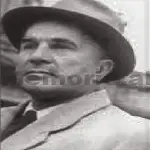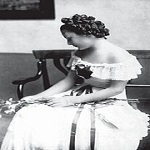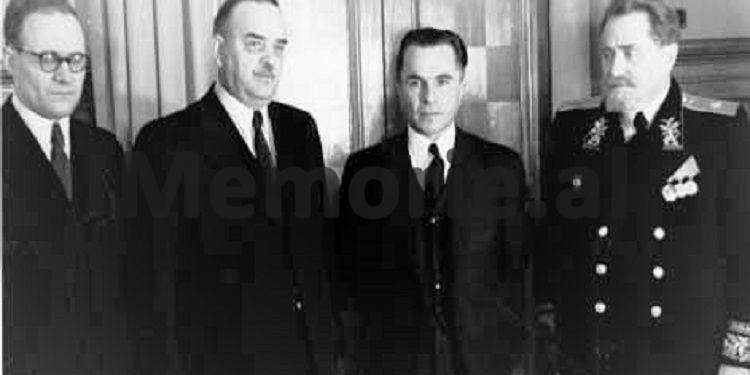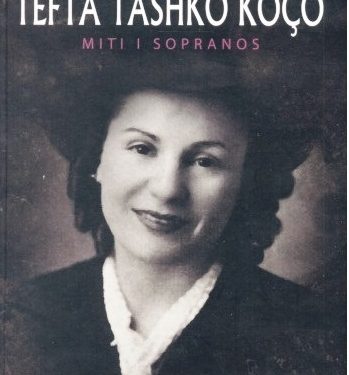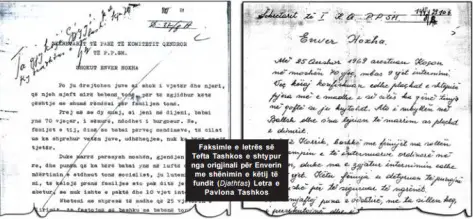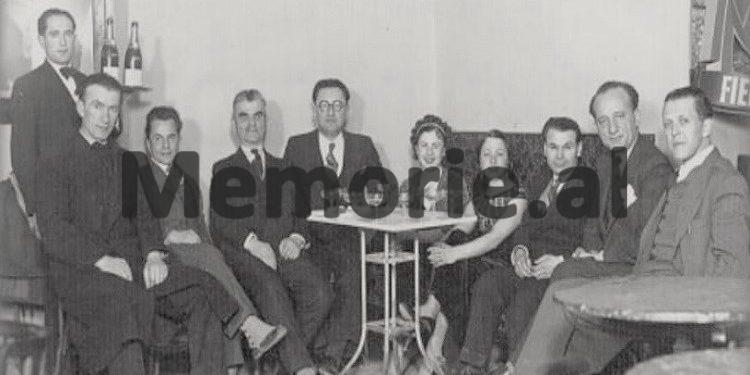Memorie.al / In June 1969, Koço Tashko was the oldest convict in Burrel prison. He was found there from the internment camps, when he turned 70 years old. In the terrible conditions, in addition to his advanced age, his life was made even more unbearable by a multitude of diseases. This was the reason why his family members, in the letters they sent to Enver, asked him to intervene to return him home. “I turn to you, wrote my daughter, Tefta, as an old friend and someone who knows our father quite well, to solve this issue, since he, apart from the thoughts that he has expressed only to you, the leadership, has not do nothing else”.
More or less the same message was conveyed to the head of the regime by Tashko’s wife, Pavlina, an early acquaintance of Hoxha, who, at the same time, with the request to allow her husband to die at home, brought to the attention of her former friend the family the extraordinary ordeal of suffering they experienced since the day of Koço’s punishment.
Unlike many requests of this type, where the appeal for some kind of mercy is most noticeable, this is justified for the difficult spiritual conditions in the conditions of lack of freedom, the correspondence of Tashko’s family members, not only does not contain anything like that, but here and there there are denunciation features. Not by chance, Tashko’s wife starts the letter to Enver with the regime’s inhumane repression of her family, reminding her of the many vicissitudes during the journey from one internment camp to another.
“In addition, – she writes, – they also confiscated the spoils of the house, most of which was mine, if you remember.” Pavlina Tashko, with this way of communication, does not deserve to pray to the man who marked the fate of her family, but aware of his role in their drama, asks him, without humility, but with dignity, to intervene at least for the most fundamental things, related to the life of her family. “At least, set the children free, take them away from Semani, where hard work is not enough, but they treat them badly, persecute and insult them,” she says in despair and revolt, ending with the appeal for the release of her husband.
Despite the humane requests of the family members of the oldest prisoner of Burrell, Enver Hoxha’s reaction was as brutal as it was dismissive. After he became familiar with the content of the letters from the Seman camp, in the printed version of the original, the head of the regime expressed himself on the spot with the note: “Let the court judge, why did this traitor fill the cup”.
In short, no mercy for the former friend and historical leader of the Communist Party of Albania. In another case, with his own hand, Enveri wrote at the top of the letter: “No answer for the sworn enemy Koço Tashko”! Finally, Koço Tashko, even after this exchange of letters, would remain in prison, only to be released from there at the age of 78, in 1980. The newspaper publishes today for the first time, the full text of this correspondence, as a another authentic evidence of the dictator’s barbaric behavior, even towards his former friends, with whom he had shared the most difficult moments of the War years, but not only.
In later lectures, the head of the dictatorial regime, Enver Hoxha, referring to the letters of Tashko’s family members, would mention with unrestrained cynicism the “pleadings” of his wife and children, who, according to Hoxha, “agreed to do any thing, to atone for the father’s mistakes, if only to bring him back home”.
“But we couldn’t do it, because we have never reconciled with the class enemy, despite the crocodile tears of their relatives”, says Enveri in an official meeting, after the punishment of the group of so-called “putschists” in the army . For him, Koço Tashko, until the end, remained a “traitor and agent of Soviet revisionism”.
THE ARCHIVE DOCUMENT WITH THE LETTER OF TEFTA KOÇO TASHKOS, FOR ENVER HOXHA
First Secretary of the Party Central Committee
Comrade Enver Hoxha
I am turning to you, as an old friend and someone who knows our father quite well, to solve this matter of great importance to our family. For more than two months, as you know, our 70-year-old father, sick, has been in prison. We, his children, know that the father, apart from the thoughts, which he has expressed only to you, the leadership, has not done anything else.
Considering his age, health condition and the work that our father has done in the war and in the construction of our socialist homeland, please release him to spend with his family the few days he has left, because they were not few and 10 years of exile. We remain in great hope to celebrate the 25th anniversary of liberation together with our father.
With respect
Tefta Koço Tashko
Seman, 31/VIII/1969
Enver’s note: Let the court judge why this traitor filled the cup.
LETTER OF PAVLINA TASHKOS, ADDRESSED TO THE FIRST SECRETARY OF THE PPS CENTRAL COMMITTEE, ENVER HOXHA
First Secretary of the Party Central Committee
Enver Hoxha
On June 25, 1969, Koço was arrested at the age of 70, after 9 years of exile. In addition, they also confiscated the spoils of the house, most of which was mine, if you remember. They closed them in Ballsh and did not allow us to take the winter spoils either. On July 12, together with the children, we were brought to the camp of ordinary internees, in Seman, extending our internment for another 5 years.
Here the children were forced to work in the fields to provide food. But hard work is not enough, they treat them badly, persecute them and insult them. I offer this prayer to you, with hope. Set the children free and remove them from Semani where they are trying to make them one with the “regulars”. Don’t let my children turn 30, having spent half their lives in exile.
Allow us to withdraw the spoils from Ballshi, because they have been there for three months, in the hands of others who have lost a part of them. As for Koço, let him spend the day at home, near his family, so that we too can celebrate happily like everyone else, the 25th anniversary of the liberation of the homeland together with him.
I wait with great hope
Pavlina Tashko
Seman, October 5, 1969
ARCHIVE DOCUMENT, WITH THE ANSWER OF ENVER HOXHA, TO THE DAUGHTER OF KOÇO TASHKO
“There is a court decision, to be applied as for other enemies”
“Let the court judge why this traitor filled the cup”. These few words, written by hand at the top of the letter, that Koço Tashko’s daughter addressed to Enver in August 1969, are the only reaction of the head of the communist regime to her request to let her father die. in home.
Determined in his attitude towards his former friend, Hoxha is more dismissive of Tashko’s wife’s appeal. Even in her case, she does not deserve to express herself at all, passing the letter to Hysni Kapo, the secretary of the Central Committee of PPSh, with the order: “No answer for the wife of the enemy Koço Tashko”.
Until, Hoxha’s close associate, who knew the boss’s “language” well, before putting it in the archive files, does not forget to make a note of the case: “Such matters are dealt with by the justice bodies”.
In short, those who sent him to Burrell’s hell did not change their minds (there was no way it could happen otherwise), until the end. After all, they hadn’t taken him there for vacations. But who was the man who postponed the days of old age in the cells of the infamous prison and what was the common history that he had made with the historical leadership of the Communist Party of Albania, Enver Hoxha…?
WHO WAS KOCO TASHKO?
Koço Tashko was one of the personalities of the early history of the communist movement in Albania. The brother of the famous singer, Tefta Tashko, and the son of the well-known patriot, Thanas Tashko, was born in Fajun, Egypt, on July 14, 1899. His father, Thanas Tashko, was among the most prominent activists of the national movement. Koço Tashko grew up in this family and was educated as a child with the ideas of the National Renaissance. He went to the USA and took an active part in the patriotic movement of Albanian emigration, in the organization “Vatra”, in the newspaper “Dielli”, etc.
He graduated from Harvard University in political economy. He served as the consul of Albania in the USA and after the overthrow of the Noli government, he took an active part in the democratic movement in migration. He was one of Fan Nol’s old friends and was well known even at King Zog’s court, from which he was made quite a few offers for state offices. Enlightened by communist ideas, Tashko went to Moscow.
There he was involved in the activities of the “Comintern” and in 1938, he was sent to Albania to found the Albanian Communist Party. Koço Tashko is at the same time a dissident of the communist regime, for which he fought quite a bit, to bring it to Albania, experiencing the inhumane persecution from the man he offered as the head of the Albanian Communist Party.
HARVARD STUDENT
Koço Tashko is one of the former leaders of the Albanian communist movement, with the most qualified schools of the time. After primary education in Egypt, Tashko continued the Protestant college “Hai School”, in Beirut. Then he completed his studies at the famous Harvard University, in Boston, precisely in the branch of Political Economy, or International Relations, as it was called otherwise. From here he went to Moscow and finished the high school of the “Comintern”, or the Faculty of Philosophy, as it was called in the language of the time, where he was also appointed a lecturer.
CONSUL IN THE USA, AMBASSADOR TO THE SOVIET UNION
Koço Tashko is known as a lecturer at the high school of philosophy in Moscow and was simultaneously the head of the Anglo-American section of the “Comintern” at that school. He was Fan Noli’s personal secretary, during the time he was a member of the Parliament of Albania. In the years 1923-1924, Tashko was twice appointed consul of Albania in New York, a diplomatic title, with which Albania was represented in America at that time. Later, Koço Tashko continues in such functions as an editor in the patriotic newspapers “Idealisti” or “Emigranti” in America.
In 1937, he performed the task assigned by the “Comintern” as the head of the Balkan section “MOPRR” in France. In 1943, precisely during the period of the National Liberation War, Koço Tashko was appointed by the General Staff of the National Liberation Army as secretary of the General National Liberation Council. The liberation of Albania, therefore, in 1945, finds him secretary of the Constitutional Assembly. In the years 1946-1947, Koço Tashko was appointed ambassador of Albania in Moscow.
In 1947, he was charged with the position of Deputy Minister of Foreign Affairs, which he exercised in parallel with Hysni Kapo. In 1954, he was appointed ambassador of Albania in Sofia, but after a year, that is, in 1955, as usual in such cases, he was returned from Sofia again, to be appointed to the apparatus of the Central Committee of the Party, as the head of the Commission of Control and Revision of the Party. In this position, he continued until 1960, when the political attacks of Enver Hoxha began on him, accusing him of being an agent of the Soviets.
FROM INTERNSHIP IN BURREL PRISON
In the 60s, by a special plenum of the Central Committee of the PPSh, Koço Tashko was expelled from the party, for which he came to his homeland. He spent 8 years of exile, starting from Çorrushi in Mallakastra and continuing in many areas of Albania.
After 8 years of internment, when he was 68 years old, he was imprisoned for 10 years in the high security prison of that time, in Burrel, from which he came out only in 1980, when he was 78 years old. Four years later, precisely in 1984, when he was 82 years old, Koço Tashko died in suffering and misery, in the village of Adriatic, west of the town of Mamurras, where his family continued to be exiled. Memorie.al




